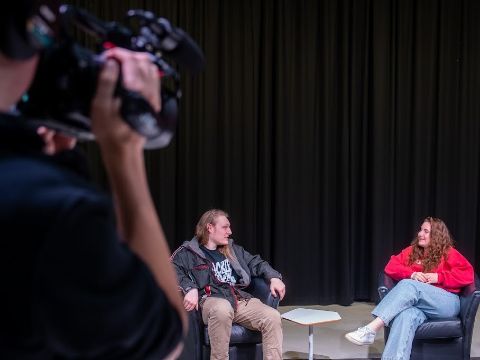A Charles Sturt University journalism academic says the evolving communication course at his institution in Australia continues to feed the ranks of the irrepressible “Mitchell Mafia’”.
Jock Cheetham, senior lecturer in news and media in the Charles Sturt School of Information and Communication Studies in Bathurst, said recent “news” of the demise of the journalism course was greatly exaggerated.
Cheetham said he was surprised to wake up and read a media report in late July suggesting journalism was not being taught separately at Charles Sturt University.

“That day I spent six hours teaching news and media, also known as ‘journalism’,” he said.
“Actually, on that Tuesday we had ABC veteran Trevor Watson visit us on campus to give a guest talk on journalism, specifically news writing, which was also streamed to online students.
“Before that talk, I spent two hours with a class analysing media coverage of The Voice to Parliament Referendum campaigns. After Trevor’s talk, I held a news writing tutorial doing practice exercises on the hard news style of reporting.”
‘Pretty journalistic day’
He said it was a “pretty journalistic” day.
“We’re still teaching journalism, with practical opportunities to work in newsrooms, such as National Radio News,” he said.
Cheetham emphasised that quality journalism had never been more important, and Charles Sturt had an enviable reputation for producing some of the world’s best, most-renowned journalists.
As the original ABC article noted, over the past five decades, the university has nurtured some of the nation’s most high-profile communicators, including Andrew Denton, Melissa Doyle, Samantha Armytage, Hamish Macdonald, Chris Bath, and current ABC News Europe correspondent Nick Dole.
“Charles Sturt University will continue to educate and train journalists for the evolving media landscape,” Cheetham said.
“At the University campus in Bathurst we continue to have cutting-edge facilities, such as a TV studio, a community broadcasting radio station, and editing suites, for our students to gain skills and insights into working in their chosen fields.
“We’re also investing substantial funds in the communications hub that will provide new facilities for our future students.”
For example, graduates from 2021 include 7News (Central West) journalist Reuben Spargo who won the 2021 JERAA Ossie Award for ‘national student journalist of the year’.
“Charles Sturt threw practical skills at me and helped grow my confidence as a communicator,” Spargo said.
“The connections I made and the experiences I shared allowed me to hit the ground running within the industry.”
Keeping pace
Cheetham said to keep pace with the ever-changing media industry and digital advancements, Charles Sturt had launched a new communication course with its first intake last year, 2022.
“The new Bachelor of Communication offers specialisations in strategic communication, news and media — journalism, which I teach — and design and content creation,” he said.
“Teaching the critical role of journalism is still very much a priority at Charles Sturt. The changes represent a transition from one version of the journalism degree, which we have offered for more than 50 years, into a new degree program.

“The philosophy behind the new course remains the same — we’re aiming to produce people who are good storytellers. We have retained a lot of the strongest elements of the old course bringing them into the new course.”
Having industry and alumni co-design the course with academic staff offers students a unique combination of academic, discipline-specific specialisations with a sound understanding of the industry through the networking and industry connections embedded within the course.
The format of the new degree combines first-hand industry knowledge and advice, and to have industry professionals sharing knowledge, expertise and daily experiences will be a real game changer for the students.
Republished from CSU News with permission.
Article by AsiaPacificReport.nz





